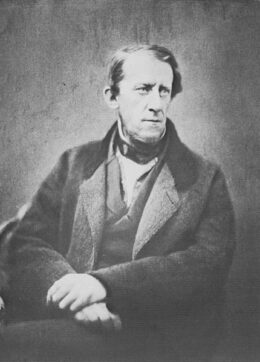
Printed
20 pages
Author(s)
Kasperls Heldentaten
Ein Ritterstück aus dem finstern Mittelalter
This play appeared in Pocci's first collection of Kasperl's plays, published in 1855 under the title Neues Kasperl-Theater. The six short plays it contains were certainly among those that Pocci performed for his children at the Ammerland house on the shores of Lake Starnberg. The author does not seem to have considered performing them outside this private circle, but he nevertheless allowed the puppeteer Josef Leonhard Schmid to bring them to the stage of his new puppet theatre. Kasperls Heldentaten is a parody of the troubadour genre, which was very popular in the Romantic period and in which Pocci had already distinguished himself as an illustrator.
A hero in spite of himself
Kasperl is the knight Kuno’s squire. While hunting in the woods, he meets a hermit who offers him food and drink. As he is in a good mood, Kasperl slaps him in the face. The situation degenerates and he ends up skewering the hermit on his halberd. Kuno arrives, unaware of this. The magician Murischuripixtimixtistopheles sets out to capture them both and cook them in his wizard's kitchen. He transforms into a monster and wants to eat Kasperl: Kasperl feeds him the hermit's corpse, but this is not enough to satisfy him. Kasperl then hits him with his halberd until he collapses, dead. The knight Kuno finally arrives, but the magician suddenly reappears: the monster was only an illusion. Kuno runs away. Kasperl does not have time to follow him. The magician takes him into his service and gives him a cauldron to watch over, threatening to cook him in the cauldron if he does his job badly. But instead, Kasperl pushes him into the cauldron, which explodes: Kasperl flies to the moon and returns to Earth after visiting all the taverns there...
First performance
Münchner Marionettentheater
Publications and translations
Franz Pocci: Neues Kasperl-Theater, Stuttgart, Gebrüder Scheitlin, 1855
Franz von Pocci: Neues Kasperl-Theater, edition Monacensia, München, Allitera Verlag, 2009
